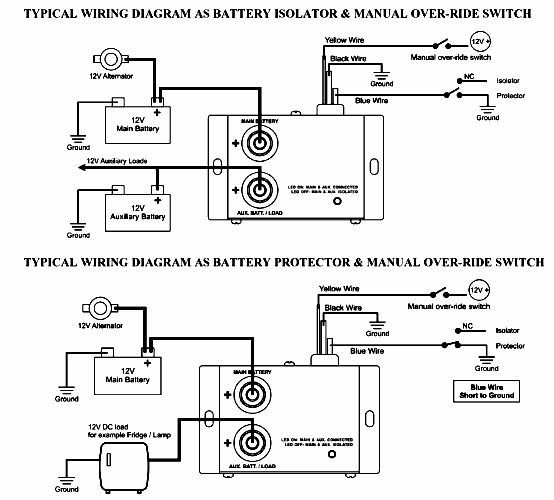
So the stuff on battery one normally only used when the motor is running and battery 1 very unlikely to be run down. In my case the stuff that came with the boat is on battery 1. You can also wire it with a switch if you think you might run down your starting battery or have a single jumper cable long enough to go from the positive wire on one battery to the positive wire on the other battery. Also their is no voltage drop to the battery. There is no relays to chatter or contacts to burn up and not make good contact. If you have a I/O with a three wire alternator then you can not do better than a battery isolator. If you have an outboard or a one wire alternator then a ACR or VCR is a better way to go.

It really depends on your boat if a battery isolator is the best way to go. Been on the boat since 1980 and it works perfect to keep both batteries charged. BOTH = both batteries power everything on the boat and both are being charged when the engine is running. BAT 2 = the second battery powers everything on the boat including the engine starter and only it is being charged when the engine is running. BAT 1 = the starting battery powers everything on the boat and only it is being charged when the engine is running. OFF = disconnects both batteries so nothing can drain them. It is a heavy duty switch with four positions. A dual battery switch is the simplest, easiest to install, and least expensive, as well as being the most versatile solutin. Again, unless the ACR has a COMBINE function that ties the two batteries together, you cannot start the engine from the second battery. When it is fully charged the ACR switches to the second battery. An ACR allows the starting battery to be the default battery and always gets charged first. A better solution (there are two of them) are an ACR (automatic charge relay) or a dual battery switch. Isolators are not something you turn on and off - they operate anytime the engine is running. They also don't allow starting the engine from the second battery if the starting battery is dead (unless you have jumper cables with you). The issue with them is there is a voltage drop across them.

An isolator is just that - it isolates the two batteries but allows the alternator to charge both of them.

Is it just a spare? These are important questions and an isolator may not be what you really need. Ask yourself first, "why am I adding a second battery?" What will the second battery be powering if anything.


 0 kommentar(er)
0 kommentar(er)
